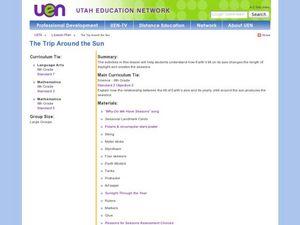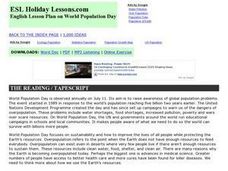San Francisco Public Utilities Commission
Recycled Water: A Smart Way to Reuse Water
Learn about wastewater and recycled water with a science reading activity. After learners finish a two-page passage about conserving the water supply, they answer six comprehension questions about what they have read.
Alabama Learning Exchange
Our Restless Planet
Students examine the topic of the Earth's rotation, revolution, and orbit. They observe teacher-led demonstrations, explore various websites, write journal entries, conduct a demonstration of why Earth experiences day and night, and...
Curated OER
The Trip Around the Sun
Sixth graders investigate the relationship between the tilt of the Earth's axis and the seasons. In this earth science lesson, 6th graders sing the song "Why Do We Have Seasons" and use simulate the Earth's tilt by using their bodies.
Curated OER
Day and Night
Fifth graders investigate the Earth's rotation and revolution and the moon's orbit around the Earth. They participate in a class discussion about how night and day occur, and take notes. Next, they watch a video about the solar system...
Curated OER
Natural Phenomena That Change the Earth's Surface
Young scholars explore a natural phenomenon. In this science instructional activity, students research a natural phenomenon and create a script about that phenomenon. Young scholars act out their scripts for the class.
Curated OER
Earth's Just Peachy!
Students are introduced to the various layers of the Earth. Using fruit, they discover each layer and discover the use of similies in describing it. They watch a video to better describe each layer of the Earth and its purpose.
Curated OER
Day and Night
In this day night compare and contrast worksheet, students examine a picture of the earth and of the sun labeling day, night, equator, sun, North Pole, and South Pole.
Curated OER
The Impact
Learn about the destruction of the rainforest by analyzing statistics. Young learners make an original line graph showing destruction in the rainforest. Additional activities include making a collage, sequencing Dr. Seuss' The Lorax,...
Curated OER
Sky Time: On the Astronomical Meaning of the Day, Year and Seasons
Learners simulate the movement of the Earth using their body motion. In this earth science instructional activity, students explain how this causes seasonal changes on Earth.
Curated OER
The Sun Affects Earth
Third graders read, write, and listen to information about the sun and its effects on the Earth.as it relates to its axis, orbit, rotate, and revolution. In this solar system lesson, 3rd graders examine how the sun effects the Earth's...
Curated OER
World Population Day
In this World Population Day instructional activity, students complete activities such as reading a passage, phrase matching, fill in the blanks, correct words, multiple choice, spelling sequencing, scrambled sentences, asking...
Curated OER
Native Planting for the Built or Green Environment
Students identify the terms used in naturescaping. They identify how to plant, how to do site preparation and how to develop a plan. Students explore the benefits of naturescaping for the health of the environment. They also...
Curated OER
Introduction to the Day and Night Sky
Students explore space science by participating in a sky observation activity. In this astronomy instructional activity, students define a list of astronomy vocabulary terms and examine star charts of the four seasons. Students gather...
Curated OER
Stellar Evolution and the Fate of Earth
Eighth graders identify the different stages in the life cycle of a star. In this astronomy lesson, 8th graders read H-R diagrams and analyze data. The describe how the Sun's evolution will affect Earth in the future.
Curated OER
Minerals of The Earth's Crust
In this earth science worksheet, middle schoolers find the vocabulary words related to minerals by unscrambling the letters. They also complete other word puzzles.
Curated OER
Lesson 2 Its a Small World (Day 2)
Students are able to explain how the water cycle recycles the earth's water supply. They are able to make use of the knowledge of land forms learned in social studies. Students are able to form a hypothesis on how/why the water cycle...
Curated OER
Minerals of the Earth
Young scholars learn and practice identifying Earth's minerals and their properties. Working in small groups, they evaluate minerals. This is a well-described lesson, which students enjoy.
Curated OER
Heating the Earth
Middle schoolers explore how the angle of sunlight affects the Earth's temperature and seasons and then apply this understanding to their local situation.
Curated OER
Night and Day
In this night and day instructional activity, students read 4 statements, look at the arrows to where the statements are pointing to on a globe and answer each one as true or false.
Curated OER
Connect the Spheres: Earth Systems Interactions
Is everything really connected? Take your class on a walk outside, where they will make observations and write them down on a worksheet. Once they are back in the classroom, learners will work to determine if and how things like birds,...
NASA
Down to Earth
There are only 10 types of people in the world: those who understand binary and those who don't. The lesson includes four activities in which students learn binary, convert binary to images, understand CCD arrays, and interpret...
Colorado State University
How Does the Earth Cool Itself Off?
Where does all the heat go when the sun goes down? An interesting lesson has learners explore this question by monitoring the infrared radiation emitted over time. They learn that hot spots cool more quickly that cooler spots.
Curated OER
Don't Let the Earth Down
Writing a persuasive argument starts with a clear thesis. Using this resource, your class will write a persuasive paper on a conservation issue. They will then transform their argument into a 30-second public service announcement. If...
Curated OER
Don't Let the Earth Down
Although recycling is definitely beneficial, reducing our waste and conserving our natural resources should really be the focus of environmentalists. Encourage the future generation to create a public service announcement about a...
Other popular searches
- Science Earth Day Activities
- Science Earth Day Lessons
- Science Earth Day
- Earth Day Science Projects
- Earth Day Science Lesson Plans
- Earth Science Earth Day

























